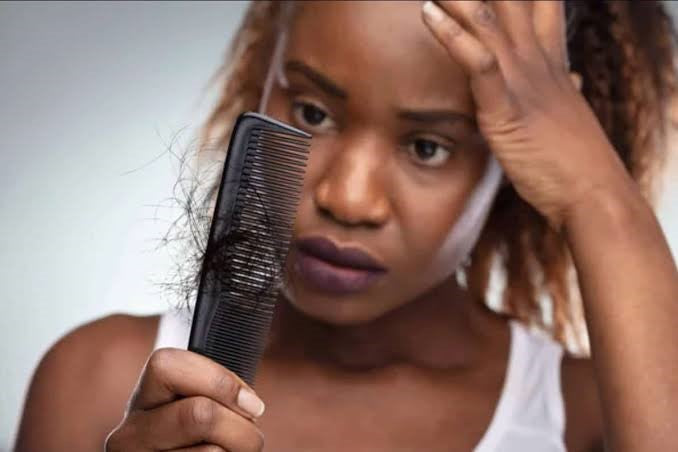Can stress cause hair loss?
The short answer is yes, stress can cause hair loss, or contribute to it. There are three types of hair loss that can be triggered (or made worse) by stress – telogen effluvium, alopecia areata and trichotillomania. Stress-related hair loss is often temporary, so it’s unlikely your hair will be lost forever. But it’s still important to speak to a doctor about it, especially if it’s bothering you.
No matter what your age or gender, hair loss can be upsetting and worrying – particularly if you don’t know what’s causing it. While it’s natural for the hair to thin as we get older, sudden or patchy hair loss can sometimes be a sign of an underlying condition or a reaction to medical treatment. Stress can also be a reason for hair loss.
In this article we’re going to look at the types of hair loss, why stress can cause hair loss, symptoms and potential treatments.

Why does stress cause hair loss?
Though we tend to think of stress as a psychological issue, it can affect your body. If you’ve ever experienced a period of significant stress you’ll know it can cause a long list of symptoms, including problems sleeping, headaches, and heartburn.
Stress symptoms are linked to the body’s “fight, flight or freeze” response. This is a survival response to stressful or potentially dangerous situations. Our body releases stress hormones such as cortisol which help us through this particular situation.
But if the stress is ongoing (also known as “chronic”), we might have an excess of stress hormones circulating through our body. This can have a negative effect on your body – and it can also cause hair loss.
Stress pushes a large number of hair follicles into the resting phase where they stop growing. Then within a few months these hairs might suddenly fall out. You may notice this when brushing or washing your hair.
Stress-related hair loss types
The symptoms of hair loss caused by stress can vary on the person and the type of hair loss you’re experiencing. The different types of hair loss that can be caused by stress are telogen effluvium, alopecia areata and trichotillomania.
- Telogen effluvium
The type of hair loss most commonly caused by stress is telogen effluvium. We have hundreds of thousands of hairs on our head and not all of them are actively growing all of the time. Hairs that are growing are in the “anagen” phase. Hairs that are resting are in the “telogen” phase – this means they have stopped growing but will stay on the head for a few more months before falling out.
In people with telogen effluvium, more hairs move from the anagen phase into the telogen phase. This means that you end up losing more hair than is normal. On average, a person with this condition might lose up to 300 hairs each day – the average for healthy hair is around 100. You may notice:
- Increased hair shedding
- Thinning hair
- Scalp sensitivity
- Slower hair growth
It isn’t clear why, but studies have shown that stressful experiences can cut short the anagen phase and push more hairs into the telogen phase. This is why stress is known to be a trigger for this type of hair loss.
- Alopecia areata
Alopecia areata is another type of hair loss that can be triggered by stress. This type of alopecia is believed to be related to the immune system. It usually causes a very distinctive type of hair loss, where small coin-sized bald patches appear across the scalp, face, and body.
Stress is thought to be a trigger that can set off the symptoms of alopecia areata. People who experience patchy hair loss can often recall a stressful event a few weeks before they first started noticing the hair loss.
It’s not clear why this happens but one theory is that stress hormones affect the immune system, causing the immune cells to target hair follicles.
- Trichotillomania
Trichotillomania is the compulsive urge to pull out your own hair. People may pull out their eyebrows, eyelashes and hair on other parts of their body. While we don’t know exactly what causes trichotillomania, it’s thought that for some people stress can be a factor.
Symptoms of trichotillomania can include:
- Repeatedly pulling out your hair
- Feeling growing tension before pulling your hair or if you try to stop
- Feeling pleasure or relief after pulling
- Unusual shaped bald patches on your head
- Bald patches are on one side of the head
Does stress-related hair loss grow back?
For most people, stress-related hair loss will be temporary, and it’s simply a case of “waiting it out”. This is particularly the case with telogen effluvium, which normally resolves within six to nine months.
It’s also fairly common for people with mild alopecia areata to experience regrowth.
Treatment options for stress hair loss
Stress-related hair loss can be frustrating and, well, stressful. However, regrowth is very possible, and with time, patience, and some good old fashioned effort, you can conquer your stress hair loss.
Managing your stress
Reducing the amount of stress we experience can benefit more than just our luscious locks. Finding ways to manage our stress can positively affect all aspects of our overall physical and mental well-being, including our weight, skin health, and anxiety levels.
Below are the 6 ways which will help you to kick out your stress
- Exercising - Getting your sweat on is a great way to boost endorphins (the happy chemicals released when you work out!) and reduce stress.
- Practicing yoga - Not only is yoga great for stretching and toning your bod, but it’s also a great way to clear your mind and cultivate calm.
- Breathing - Rolling some breathing exercises into your day can help root yourself in the moment and let what’s stressing you out go.
- Meditating - Meditation and mindfulness are great ways to clear your mind and ground yourself in the present, ease stress, and enter a state of tranquillity. While it can take time to get into the groove of meditating, sticking with it is well worth the effort.
- Journaling - Writing out how you feel can help you understand your stress, where it’s coming from, and how you can overcome it.
- Doing what you love - If you love it, do it! Reading a novel, going for a hike, rocking out to your favourite music, or whatever else may spark joy can help you ease feelings of stress or anxiety.
Others treatments and options for stress related hair loss are:
- Maintaining a healthy diet
How and what we eat can have a big impact on our entire body, including our hair. By eating a healthful, well-balanced diet, you can promote hair growth and prevent future loss.
Getting plenty of vitamins and nutrients is key to maintaining a balanced diet. Eating foods rich in essential vitamins or taking supplements can help you get your daily dose of hair-healthy nutrients.
- Using topical treatments
There are many different topical options available to treat hair loss. These are applied directly to the affected area(s) and can possibly stimulate hair growth over time.
Popular topical remedies include:
- Nature’s Version of Minoxidil - Minoxidil is an over-the-counter (OTC) med that’s applied directly to your scalp, brows, or beard. TBH, researchers aren’t completely sure how it works, but they think it may help keep the active growth phase growing longer. But minoxidil comes with its own side effects and it doesn’t work for everyone. Root2tip has formulated a fantastic product Root Energizer Scalp Oil which is natural alternative to minoxidil. Its Ayurvedic-infused formula nourishes and stimulates the scalp to improve blood flow and create an optimal environment for hair growth.
- Protein Treatment – Protein is the building blocks or the heart of the hair. Without enough protein in the hair your hair will break off and look lacklustre. With extensive research and formulation Root2tip has made an effective product which is Triple Protein Mask. This product is a unique blend of silk, wheat, and henna hydrolysed protein extracts and is designed to give you strong, healthy hair.
- Home remedies - Castor oil, rosemary oil, and black tea have all been used as at-home remedies for hair growth. We recommend using Root2tip’s Grow It Long Scalp Serum which is not a home remedy but it’s scientifically blended solutions and has all these essential oils as ingredients and is know for it’s highly effective results.
Conclusion
Stress can wreak havoc on your body and your mind. Stress-related hair loss can be a result of excessively stressful events or environmental stressors, and generally is related to one of three conditions: telogen effluvium, alopecia areata, or trichotillomania.
There are several treatment options available for overcoming stress hair loss. Eating a healthy diet, taking care of your hair, using topical medications, and — most importantly — finding ways to manage your stress can all help keep your tresses in check. Visit us at www.root2tip.com

